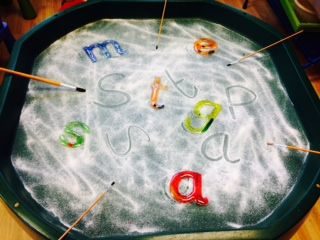Sheree is our Literacy Champion.

Literacy in Early Years
There are a large variety of opportunities and experiences for children to develop their Literacy skills in Early Years, through “Listening and Talking”, “Reading” and “Writing”.
We follow the Early Level of the Curriculum for Excellence, which is a learning, teaching and assessment tool that highlights and identifies different aspects of Literacy development for children ages 3-5 years.
We focus on pre-literacy skills in Early Years, where children explore, investigate and practice the foundation skills that they will need in later life through education and in to adulthood. This includes, pre-writing, pre-reading and listening and talking skills. Please see these individual page tabs for further information.
Sharing the children’s play and learning
We will share some play and learning activities that the children at Whatriggs take part in during their time in the centre, you will find this in either the individual playroom tabs, or the “Literacy in the playroom” tab.
Word Aware
We have a teaching tool called “Word Aware” which helps to develop children’s understanding and awareness of new words, as well as expanding and exploring new concepts. This is implemented in a fun and interactive way, to encourage children to join in and take part, developing their literacy and vocabulary.
Why do our children and young people need Literacy skills
Literacy development is highly valued and important to early years. Developing literacy skills impacts on our children’s future and there are many skills that ourselves as adults have or rely on, from every day tasks to important aspects of our adult life.
Examples of how literacy skills may be useful or important in adulthood:
Reading:
- Reading an email or a letter in the post
- Reading a road sign or a hazard sign
- Following instructions or directions
Writing:
- Applying for a job, filling out the application form
- Writing your shopping list
- Filling out a prescription form
Listening and Talking:
- Expressing how you are feeling or asking for help
- Being able to have a conversation with someone, whether it be face to face or on the phone
- To be able to build relationships with others
If you think of how many times in a day you rely on literacy skills, whether that is during daily tasks in the home, during your drive to or from work, in your working day or even during your leisure time when relaxing.
Literacy is important for us all and it starts with our children and young people exploring, investigating and playing with these skills. We encourage and value these skills in early years and we provide opportunities to continually support and extend the children’s understanding, abilities and skills in order to become successful and effective adults later in life.


